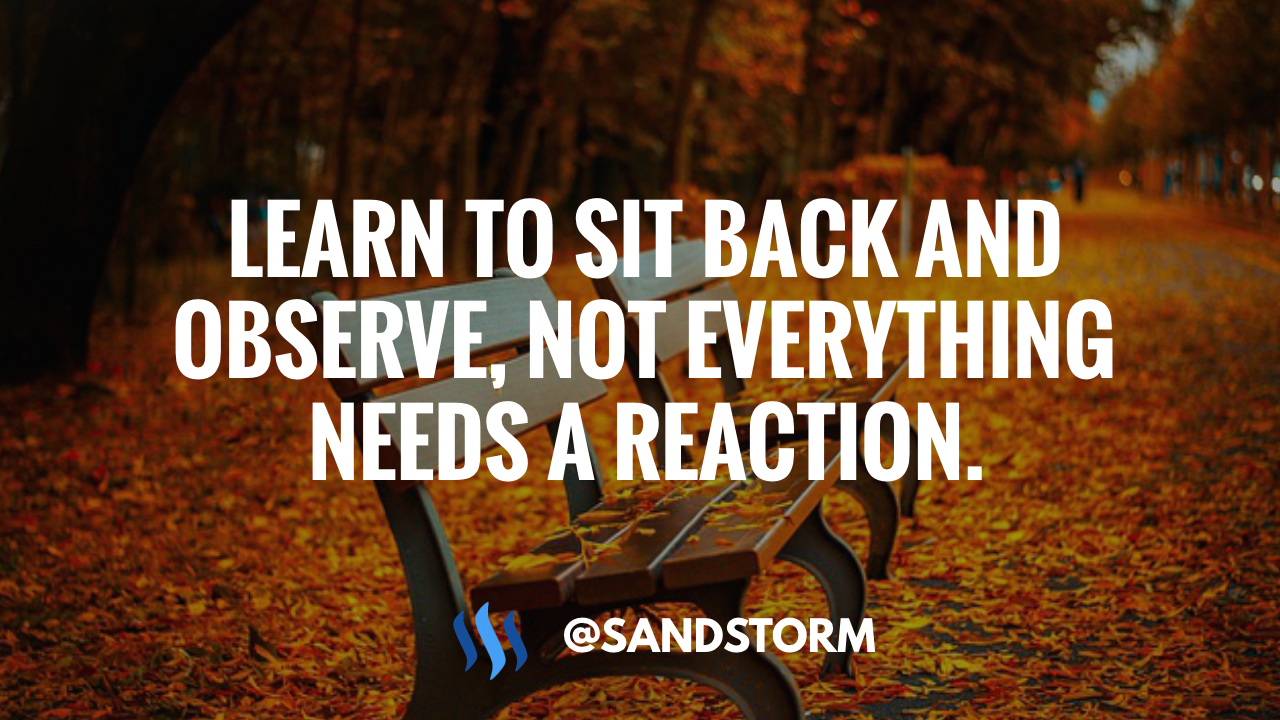In today’s fast-paced world, where everything seems to demand our immediate attention, the art of sitting back and observing has become a rarity. We live in an era of constant connectivity, where notifications on our devices compete for our focus, and the pressure to respond instantly is palpable. However, amidst this chaos, there lies a valuable skill — the ability to step back, take a moment, and observe without feeling the need to react immediately. This skill is not just a luxury; it’s a necessity for our mental well-being, decision-making process, and overall quality of life.

The Rush of Modern Life:
Our lives are characterized by a perpetual sense of urgency. From the constant stream of emails demanding swift replies to the pressure of staying updated on social media, the modern world bombards us with stimuli that scream for our immediate attention. This incessant urgency not only affects our mental health but also impacts our ability to think critically and make well-informed decisions.
must read= learn to sit back and observe.
Consider the analogy of a crowded intersection. In the rush of traffic, it becomes challenging to navigate safely. Similarly, in the hustle of our daily lives, making decisions without taking a moment to observe can lead to metaphorical collisions and missteps.
The Power of Observation:
Observation is a powerful tool that often goes underutilized in our quest for instant gratification. By taking a step back and observing, we allow ourselves the opportunity to gather information, assess situations more accurately, and approach challenges with a clearer perspective.
Think about a chess player contemplating their moves. Each decision is made after careful observation of the board, anticipating the opponent’s strategy, and considering various outcomes. Similarly, in the game of life, the ability to sit back and observe allows us to make more strategic choices.

Cultivating Patience:
Patience is a virtue that seems to be dwindling in the face of our fast-paced lifestyles. Learning to sit back and observe is, in essence, a practice in cultivating patience. It’s an acknowledgment that not everything requires an immediate response and that allowing time to pass can provide a valuable perspective.
In a world obsessed with quick fixes and instant results, embracing patience becomes a rebellious act. It challenges the status quo and invites us to resist the urge to succumb to the pressure of immediacy. By practicing patience, we unlock the door to a calmer, more collected version of ourselves.
Reducing Stress and Anxiety:
The constant need to respond instantly to messages, emails, and social media updates can contribute significantly to stress and anxiety. The fear of missing out (FOMO) and the pressure to keep up can take a toll on our mental well-being. Learning to sit back and observe is a powerful antidote to this stress.
Taking a pause allows us to disconnect from the incessant noise of the digital world and reconnect with our thoughts and emotions. It’s a form of self-care that can help in maintaining a healthy balance between the virtual and real aspects of our lives.
Enhancing Decision-Making:
Rash decisions often lead to regret. In the professional and personal spheres, decisions made without careful consideration can have far-reaching consequences. By learning to sit back and observe, we provide ourselves the opportunity to gather relevant information, weigh the pros and cons, and make decisions that are informed and thoughtful.
Consider a leader faced with a critical business decision. Instead of succumbing to the pressure for an immediate response, taking a step back to observe market trends, consult with stakeholders, and analyze potential outcomes can lead to more successful and sustainable choices.
Mindfulness and Self-Reflection:
Sitting back and observing is closely tied to mindfulness — the practice of being present in the moment without judgment. It involves paying attention to our thoughts and feelings without reacting impulsively. By incorporating mindfulness into our lives, we foster self-awareness and develop a deeper understanding of ourselves and the world around us.
In the quiet moments of observation, we can reflect on our goals, values, and aspirations. This self-reflection is essential for personal growth and fulfillment. It allows us to realign our actions with our long-term objectives, ensuring that our journey is purposeful and meaningful.
Embracing the Art of Doing Nothing:
In a culture that glorifies busyness, the concept of doing nothing can be unsettling. However, doing nothing is not synonymous with laziness or incompetence. It is a deliberate choice to disengage temporarily from the demands of productivity and simply be.
The art of doing nothing, or ‘niksen’ as the Dutch call it, has proven benefits for creativity and overall well-being. When we allow ourselves the luxury of idleness, our minds wander, and new ideas emerge. It’s in these moments of quiet observation that innovation often takes root.
Conclusion:
In a world that rushes us from one task to another, the ability to sit back and observe is a skill worth cultivating. It’s a conscious choice to break free from the shackles of immediacy, embrace patience, and engage with the world in a more deliberate manner. By learning to observe, we reduce stress, enhance decision-making, and foster a deeper connection with ourselves.
In the pursuit of a more meaningful and fulfilling life, let us not forget the wisdom encapsulated in the simple act of sitting back and observing. As the world clamors for our attention, the true power lies in our ability to choose where we direct it. So, let’s take a step back, breathe, and appreciate the beauty of the present moment, for not everything needs our immediate response.
